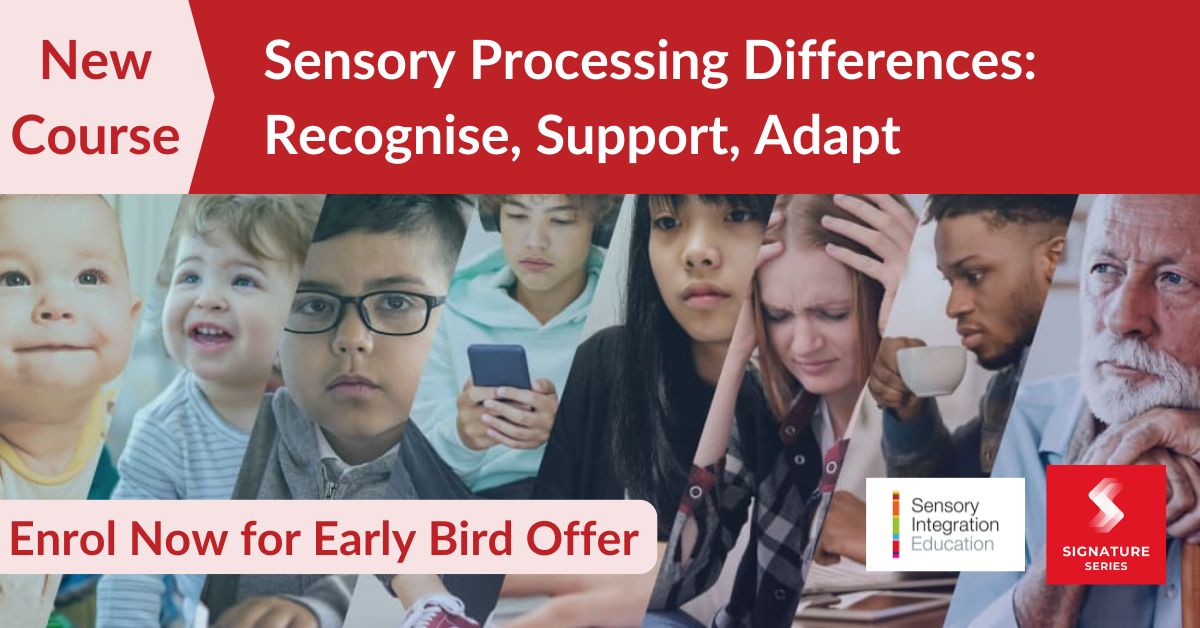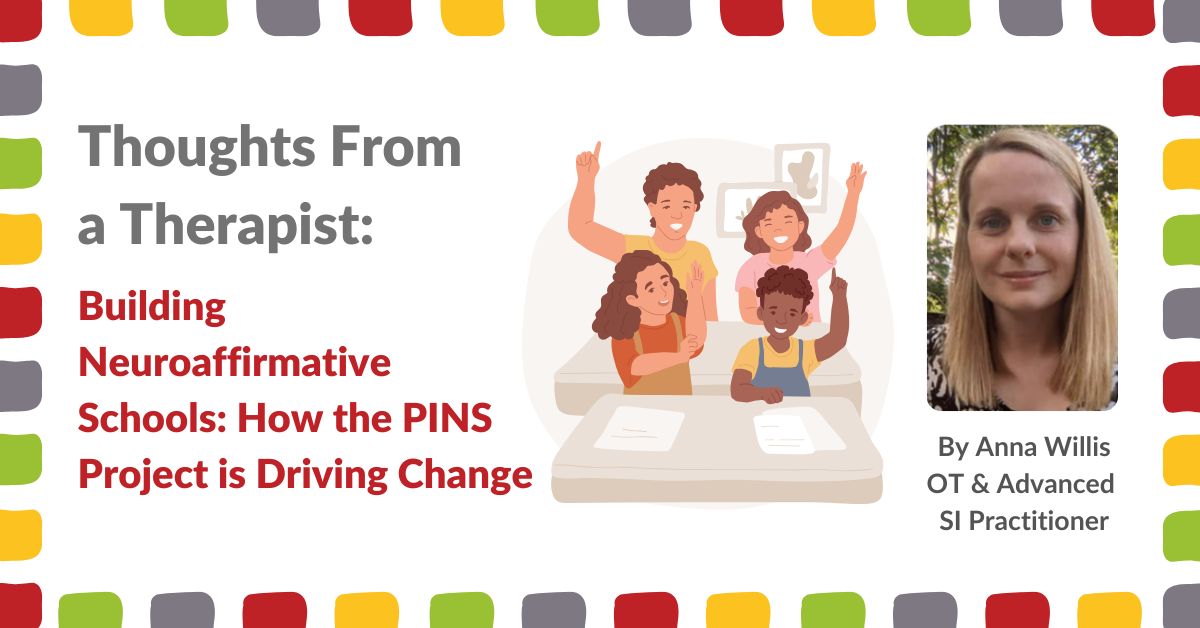EmphaSIze April 2025: Neurodiversity and Neuroscience
By Sensory Integration Education, 2nd April 2025

Welcome to the April issue of EmphaSIze where this month we're focusing on Neurodiversity and Neuroscience!
Hot on the heels of last month's Neurodiversity Celebration Week, in this issue of EmphaSIze we've put together useful articles, research, books, and product ideas to help better inform ourselves about neurodiversity so that we can put into practice actions to be more inclusive in our settings when working with clients.
Also if you're a health or care professional looking to integrate a more sensory-informed approach in your practice, we've a new course Sensory Processing Differences: Recognise, Support, Adapt that could be exactly what you're looking for. More details are in the article below!
We’re on the look-out for new speakers for our 2026 Lifelong Learning Webinar Programme too! It may only be April, but we’re already starting to put in place plans for next year's Lifelong Learning Programme. Read the article below and if you're interested in sharing your SI expertise, passion or research by hosting one of our webinars next year, we’d love to hear from you!
News & Features
Recognise, Support, Adapt – Sign Up to Our New Sensory Processing Course for Just £149 (Early Bird Offer Ends 28 April!)
Are you a health or care professional looking to integrate a sensory-informed approach into your existing practice? If so, our new course ‘Sensory Processing Differences: Recognise, Support, Adapt’ could be exactly what you’re looking for. Explore the foundational theory of Ayres Sensory IntegrationⓇ (ASI) and how to apply these principles alongside the Person, Environment, Occupation (PEO) model to better support individuals with sensory processing differences across the life span:
- Recognise: Learn to recognise sensory processing differences and understand their impact on daily life.
- Support: Support individuals in identifying their sensory preferences and developing strategies to enhance participation. Gain insight into your role within the multidisciplinary team (MDT) and understand when and how to refer to an Ayres Sensory Integration practitioner for further assessment or intervention
- Adapt: Identify appropriate assessment tools and intervention approaches relevant to your professional setting focusing on principles of the PEO model.
While the course does not provide certification for full ASI practice, it equips you with the practical knowledge and skills to begin embedding sensory integration principles into assessments and interventions. It also serves as an ideal stepping stone for those interested in pursuing postgraduate training in sensory integration.
Also if you sign up for the self-directed course option before 28 April, you can take advantage of our Early Bird Offer price of £149 (standard price will be £195).
The course starts on 28th April with 60 days’ access and you can find out more here.
Calling All Sensory Integration Practitioners! Host a Webinar and Share Your Expertise in the SIE 2026 Lifelong Learning Programme
Now that 2025 is in full swing, we’re turning our attention to planning the 2026 Lifelong Learning Webinar Programme—and we’d love to hear from you!
We are looking for Sensory Integration practitioners who are interested in sharing their knowledge, experience and passion with our learning community. Whether you’ve implemented a project, published a research paper, or have expertise in a specialist clinical area, why not consider presenting a webinar to our community next year?
If you haven’t presented before, there’s no need to worry as we’ll support you to develop your presentation and guide you through the process.
If this has sparked your interest and you’d like to find out more about being part of the 2026 programme, please get in touch with a brief outline of your proposed topic by emailing us at: [email protected].
We look forward to showcasing the brilliant work happening across our community and continuing to support ongoing professional development.
Thoughts from a Therapist: Building Neuroaffirmative Schools - How the PINS Project is Driving Change
In this month's Thoughts from a Therapist blog and in celebration of last month’s Neurodiversity Celebration Week, Anna Willis of Active Play Therapies shares with us the inspiring work she’s been doing as part of the PINS project she’s involved in.
The Partnership for Inclusion of Neurodiversity in Schools (PINS) is a national programme that aims to support the education and health needs of neurodiverse children in schools through a partnership approach, working with organisations such as Active Play Therapies as well as our own Sensory Inclusive Schools.
Sensory Challenges Visiting the Dentist 
For individuals with sensory processing differences, a trip to the dentist can be overwhelming. Over-sensitivity to teeth cleaning, fear of moving backwards in the chair, distress from loud dental tools or strong reactions to clinic smells are some of the challenges they may have to face.
However small adjustments can make a big difference. In her latest blog, SIE’s Dr Lelanie Brewer highlights ways dental professionals can support patients with sensory needs including dimming lights, playing calming music through headphones, using quieter tools, or slowly introducing new sensations.
Sign Up to One of Our Upcoming Sensory Spotlight Talks!
To mark World Autism Acceptance Month this month, we’ve lined up 2 thought-provoking Sensory Spotlight Talks for you!
On Tuesday 8th April, Dr Annemarie Lombard will host her Sensory Spotlight Talk: Inclusive Design with Sensory Intelligence®. In this webinar, she will explore why a one-size-fits-all workplace doesn’t exist and how inclusive design is critical for creating environments that cater to diverse sensory needs.
Key learning outcomes include:
- How PEO (Person-Environment-Occupation) Model guides sensory-friendly spaces
- Practical tools, including the Senses@Work™ framework and Sensory Audit™, to assess and design environments that reduce sensory overload and enhance focus and well-being
- The 7 key guidelines for inclusive workplace design
Our next Sensory Spotlight Talk takes place on Thursday 8th May: Understanding Motor Disinhibition in Autism and will be hosted by SIE Fellow Virginia Spielmann.
This Sensory Spotlight Talk is a must-attend for SI therapists working with autistic individuals.
Motor disinhibition is often misunderstood as a behavioural challenge when, in reality, it’s rooted in neurology. In her Talk, Viriginia will explore the prevalence of motor disinhibition in autism and profound dyspraxia, providing insights into assessment, intervention and neurodiversity-affirming practices.
Attendees will learn:
- How to distinguish motor skill difficulties from behavioural responses
- Neurological insights into motor disinhibition
- Evidence-based strategies for assessment and intervention
- How to create supportive environments that respect sensory motor needs while promoting participation
Please note both these Talks are free to attend for SIE Lifelong Learning Members. We look forward to seeing you there!
Also see:
Sensory library project launches at Coventry Central Library
How autism can affect your relationship with food
New sensory space for neurodivergent students opens at Kingston University
Bosses urged to do more to support neurodiverse staff
Resources

Take a look at our books and products recommendations for this month:
Neurodiversity in the Early Years: Practical and Proven Strategies to Enable Neurodivergent Children to Thrive: How we support children in their early years to understand, to be accepted for their unique differences and to thrive, has a life-long impact. With a neuro-affirming, strength-based narrative running throughout, this accessible book will help to improve your knowledge, skillset and practical application of high-quality neuro-inclusive practice.
Neurodivergent Ninja: A Children’s Book About the Gifts of Neurodiversity (Ninja Life Hacks): The Ninja Life Hacks book series was developed to help children aged 4 – 10 years old to learn valuable life skills and the books are useful resources for parents and teachers alike. This particular book looks at embracing neurodiversity.
Designing Neuroinclusive Workplaces: Advancing Sensory Processing and Cognitive Wellbeing in the Built Environment: This book explores how to employ strategic spatial zoning and sequencing, sensory zones, patterns, textures, colours, lighting, and soundscaping to create spaces that cater to the various sensory needs of neurodivergent individuals.
Sensory Mood Pyramid: This calming mood lamp is shaped like a pyramid and is perfect for therapeutic sensory sessions. It cycles through a rainbow of colours, reflecting moods and providing relaxing visual stimulation. Fully portable, the mood pyramid can be used indoors and outdoors and is fully rechargeable.
Sleep Pod: The 'Hug Sleep' with its swaddle design is breathable, lightweight and temperature regulating and also provides deep touch pressure.
SI Research Digest

Below are links to the most popular sensory integration and sensory processing research papers and findings published on our social channels last month:
This new study investigated sleep and sensory processing in typically developing children. The researchers found a number of links between inadequate sleep and sensory processing including that children with greater sleep problems were more sensitive to visual and tactile stimuli, suggesting that these sensory systems might be especially susceptible to the effects of inadequate sleep.
This new study investigated tactile sensory processing and food rejection in young children. The researchers found strong evidence to suggest that food rejection is also influenced by the tactile characteristics of the food and children's preferences in relation to the tactile sensation of picking up the food.
This new systematic review investigated neurodivergent individuals' perception and experience of multisensory environments, including the characteristics of sensory stimuli and users’ sensory experiences of different sensory modalities. One of the key points was the importance of providing customisable sensory inputs to accommodate individual sensory preferences.
Adapting Perioperative Care for Neurodivergent Children - A Scoping Review
This new scoping review investigated adapting perioperative care for neurodivergent children. The authors conclude with a helpful checklist designed to assist healthcare professionals in building an individualised care plan for their neurodivergent patient for the preoperative, intraoperative and postoperative stage.
Upcoming Courses and Webinars
We have a number of live webinars that take place throughout the year covering a broad range of SI-related topics. Below is a snapshot of webinars happening over the next few months or click here to view a summary of all the upcoming live events.
All these webinars are available to you by signing up to our Lifelong Learning Programme or can be purchased as individual courses:
- An Introduction to Using the Adult/Adolescent Sensory History (ASH) in Clinical Practice – 7 April 2025
- Sensory Spotlight Talk: Inclusive Design with Sensory Intelligence® - 8 April 2025
- Sensory Spotlight Talk: Understanding Motor Disinhibition in Autism – 8 May 2025
- Fostering Connection and Co-regulation Through a Sensory Processing Lens – 27 May 2025
- A Virtual Reality Sensory Room for People with Neurodevelopmental Disabilities – 2 June 2025
- Introduction to the BUSS® (Building Underdeveloped Sensorimotor System) Model – 27 June 2025
Discounts & Special Offers
Please quote DISCOUNT CODE SIE20 for 10% discount on Southpaw orders up to £100. Orders must be placed by phone on +44 (0) 115 718 0020.
Would you like to receive EmphaSIze: The Sensory Integration Newsletter in your inbox? JOIN SIE FREE TODAY
Best wishes,
Sensory Integration Education
NB: Sensory Integration Education is not responsible for the content on external websites. Sharing a resource does not imply endorsement by Sensory Integration Education.







